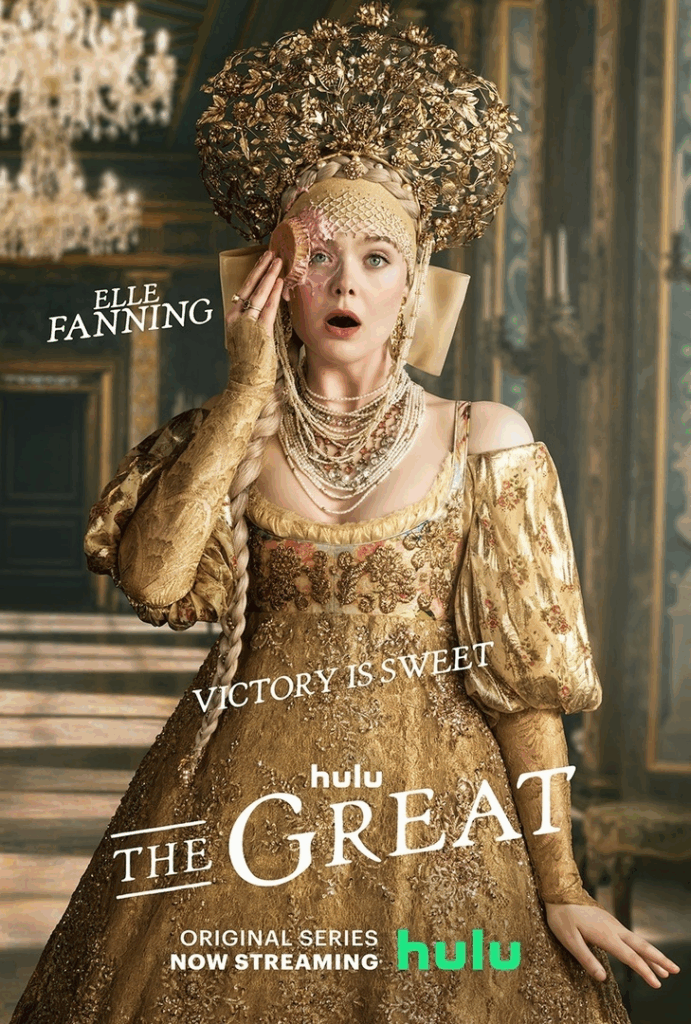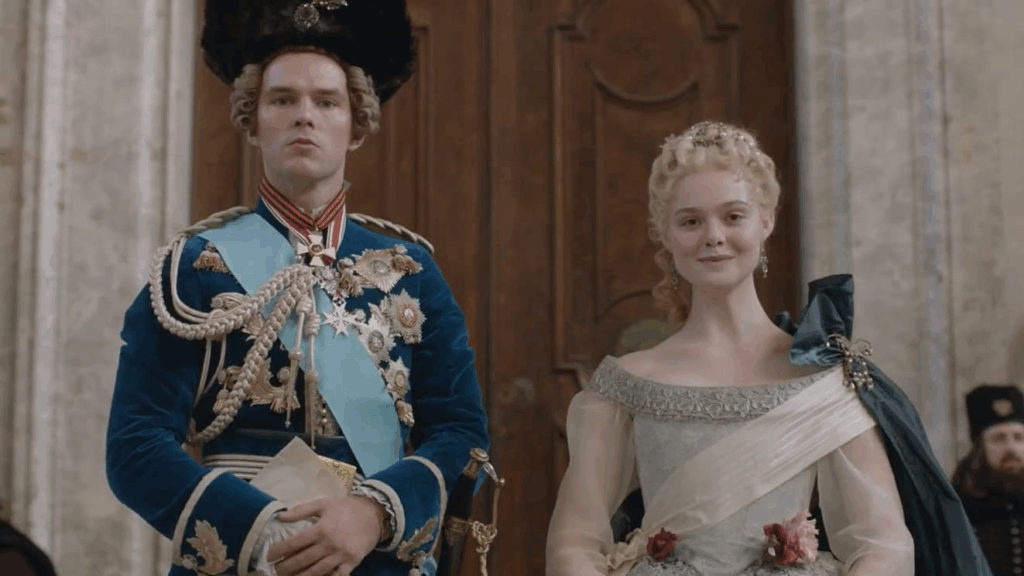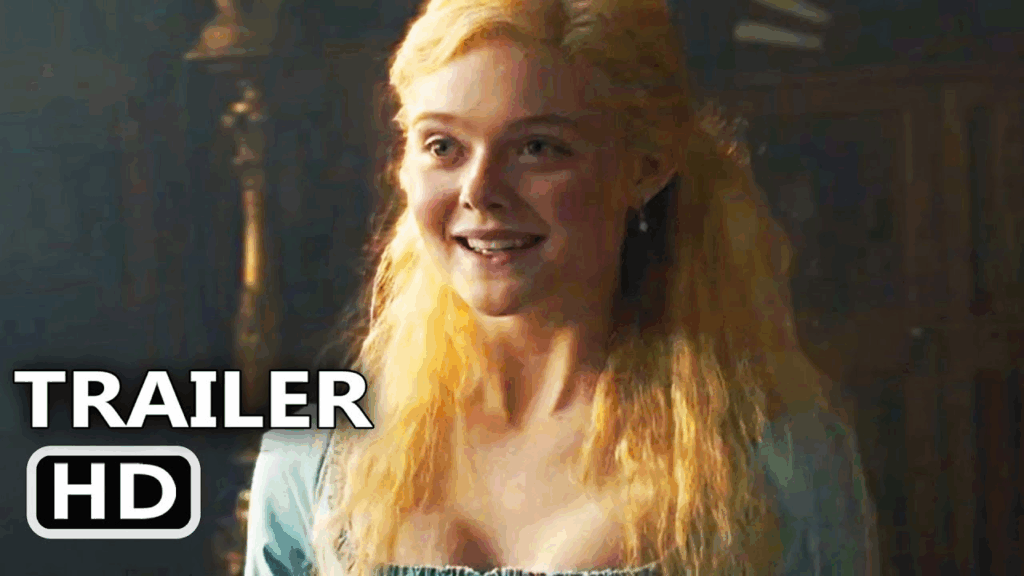THE GREAT (2020)

Introducing The Great: A Bold, Irreverent Reimagining of Catherine the Great’s Rise
In 2020, Hulu introduced The Great, a satirical comedy-drama series that reimagines the rise of Catherine the Great, Russia’s longest-reigning female ruler, with a deliciously anachronistic blend of humor, drama, and political intrigue. Created by Tony McNamara, known for The Favourite, the series stars Elle Fanning as Catherine and Nicholas Hoult as Emperor Peter III, delivering a sharp, irreverent take on 18th-century Russia that prioritizes wit over historical accuracy. Billed as “an occasionally true story,” The Great premiered on May 15, 2020, to critical acclaim, earning praise for its bold performances, lavish production, and biting satire. As the series enjoys a 2025 streaming re-release on Hulu, accompanied by bonus content and renewed cultural buzz, this article provides a comprehensive introduction to The Great Season 1, exploring its plot, cast, production, themes, and enduring appeal as a modern classic that blends historical fiction with contemporary flair.

Plot Overview: A Young Empress’s Audacious Quest
The Great Season 1 follows Catherine (Elle Fanning), a naive yet ambitious young woman from Prussia who arrives in Russia in 1761 to marry Emperor Peter III (Nicholas Hoult), expecting a life of romance and enlightenment. Instead, she finds a crude, hedonistic court ruled by a volatile and immature Peter, who prefers debauchery and violence to governance. The 10-episode season traces Catherine’s transformation from an optimistic outsider to a cunning strategist, determined to overthrow Peter and modernize Russia. Drawing loosely from historical events leading to Catherine’s 1762 coup, the series takes liberties with timelines and facts, infusing the story with modern dialogue, absurd humor, and sharp political commentary.
The plot kicks off with Catherine’s disillusionment as she navigates Peter’s court, filled with sycophants, schemers, and eccentrics. Key allies include her maid Marial (Phoebe Fox), a former noblewoman with a sharp tongue; Orlo (Sacha Dhawan), a bookish advisor yearning for reform; and Leo (Sebastian de Souza), a charming soldier assigned as her lover by Peter, sparking an unexpected romance. Catherine’s efforts to introduce enlightened ideas—science, education, and women’s rights—clash with Peter’s erratic rule, leading to comedic yet tense conflicts, such as a failed attempt to distribute smallpox inoculations and a disastrous dinner party. The season builds toward Catherine’s decision to stage a coup, manipulating allies like General Velementov (Douglas Hodge) and facing betrayals, including from her own lover. The finale, “The Beaver’s Nose,” delivers a mix of triumph and tragedy, setting the stage for her rise as Catherine the Great while highlighting the personal costs of power.
The series’ tone, described as “anti-historical” by McNamara, blends slapstick comedy (e.g., Peter’s obsession with “Huzzah!” and bear gifting) with dark drama, such as Catherine’s moral dilemmas and Peter’s violent outbursts. This juxtaposition, paired with anachronistic elements like modern slang and pop culture references, makes The Great a fresh take on the period drama, appealing to audiences who enjoy sharp wit and bold storytelling.

Cast and Characters: A Stellar Ensemble
The heart of The Great lies in its exceptional cast, led by Elle Fanning and Nicholas Hoult, whose chemistry drives the series’ emotional and comedic beats. Fanning, also an executive producer, portrays Catherine with a blend of wide-eyed optimism and steely resolve, capturing her evolution from naive dreamer to calculating leader. Hoult’s Peter is a standout, balancing childish petulance with surprising vulnerability, making the emperor both infuriating and oddly sympathetic. Their dynamic, likened to Beatrice and Benedick from Much Ado About Nothing in its banter, anchors the series, with Hoult earning Golden Globe and Emmy nominations for his performance.
The supporting cast is equally compelling. Phoebe Fox’s Marial delivers biting sarcasm as Catherine’s loyal but self-serving confidante, while Sacha Dhawan’s Orlo brings nervous energy to his role as a reformist out of his depth. Sebastian de Souza’s Leo adds romantic tension, and Douglas Hodge’s Velementov provides gruff humor. Notable performances include Belinda Bromilow as the eccentric Aunt Elizabeth, Adam Godley as the scheming Archbishop, and Gwilym Lee as Grigor, Peter’s conflicted best friend. The ensemble’s ability to navigate the series’ tonal shifts—raucous comedy to poignant drama—earned praise, with critics noting the cast’s “electric” chemistry (Vanity Fair).

Production and Creative Team: Crafting a Lavish Satire
Created by Tony McNamara, The Great builds on his Oscar-nominated work for The Favourite, sharing its irreverent tone and sharp dialogue. McNamara wrote most episodes, with contributions from Tess Morris and others, and served as showrunner. The series was directed by a talented roster, including Matt Shakman (WandaVision) and Geeta Patel, who crafted its visually opulent yet gritty aesthetic. Filmed primarily in the UK, with Hever Castle and Hatfield House standing in for the Russian court, the production boasts lavish sets—ornate palaces, candlelit ballrooms—and costumes by Emma Fryer, blending 18th-century opulence with modern flair (e.g., Catherine’s pastel gowns). The $100 million budget for Season 1 ensured a high production value, with cinematography capturing both the grandeur and claustrophobia of court life.
The score, composed by Nathan Barr, mixes classical strings with modern beats, enhancing the series’ anachronistic vibe, while pop songs like “Video Killed the Radio Star” in the credits add playful irony. Produced by MRC and Civic Center Media, The Great was renewed for three seasons, with Season 1 setting the tone for its blend of satire, drama, and absurdity. The 2025 re-release, streaming on Hulu with bonus content like cast interviews and deleted scenes, aims to capitalize on the series’ cult following and Emmy wins, including Outstanding Writing for McNamara.

Themes and Style: Power, Ambition, and Absurdity
The Great explores themes of power, ambition, and identity through a feminist lens, portraying Catherine’s struggle to assert agency in a patriarchal, chaotic court. Her push for enlightenment—science, education, equality—clashes with Russia’s entrenched traditions, reflecting modern debates about progress versus conservatism. The series also delves into the personal costs of ambition, as Catherine grapples with moral compromises, such as betraying Leo, and Peter’s unexpected depth reveals the complexity of leadership. Satirical humor underscores these themes, with absurd moments like Peter’s bear or court orgies highlighting the absurdity of absolute power.
Stylistically, The Great is a genre-blending triumph, combining period drama’s opulence with comedy’s irreverence and drama’s emotional weight. Its anachronistic dialogue (“You’re being a real dick, Peter”) and modern sensibilities make it accessible, while its Watchmen-esque deconstruction of power and morality (per the user’s context) aligns with Laurie Juspeczyk’s journey of agency in a flawed world. Critics praised its “fizzing, zinging” energy (The Guardian) and “diabolical wit” (Variety), though some noted its historical inaccuracies as a deliberate choice to prioritize entertainment over fidelity.

Expectations and Audience Reception
Upon its 2020 release, The Great earned widespread acclaim, with a 94% approval rating on Rotten Tomatoes and a 74/100 on Metacritic for Season 1. Audiences on X lauded its “hilarious and heartbreaking” tone, with fans calling Fanning and Hoult “a perfect match” and praising the series’ bold humor. Critics like Roger Ebert’s reviewer hailed it as “a bawdy, brilliant delight,” though some, like The New York Times, noted its pacing could drag in early episodes. The series won an Emmy for Outstanding Writing and garnered nominations for Fanning, Hoult, and its costumes, cementing its status as a critical darling.
The 2025 re-release, timed to leverage the series’ growing fanbase and the success of Seasons 2 and 3, introduces The Great to new viewers while rewarding loyal fans with bonus content. Its global box office equivalent, through streaming metrics, reflects its popularity, with Hulu reporting high viewership. The series’ appeal lies in its universal themes—ambition, love, betrayal—and its ability to make 18th-century politics feel urgently modern, resonating with audiences navigating today’s polarized world.

Conclusion: A Timeless Tale of Power and Wit
The Great (2020/2025 Re-release) stands as a bold, irreverent gem in the television landscape, reimagining Catherine the Great’s rise with humor, heart, and sharp social commentary. Elle Fanning and Nicholas Hoult’s electrifying performances, paired with Tony McNamara’s razor-sharp writing and a lavish production, create a series that’s as entertaining as it is thought-provoking. Its blend of satire, drama, and feminist themes, echoing the Watchmen universe’s moral complexity, makes it a fitting subject for fans of character-driven narratives. As The Great returns to Hulu in 2025, it invites viewers to revel in its audacious storytelling, proving that even in a chaotic court, wit and ambition can change the world. Huzzah!
